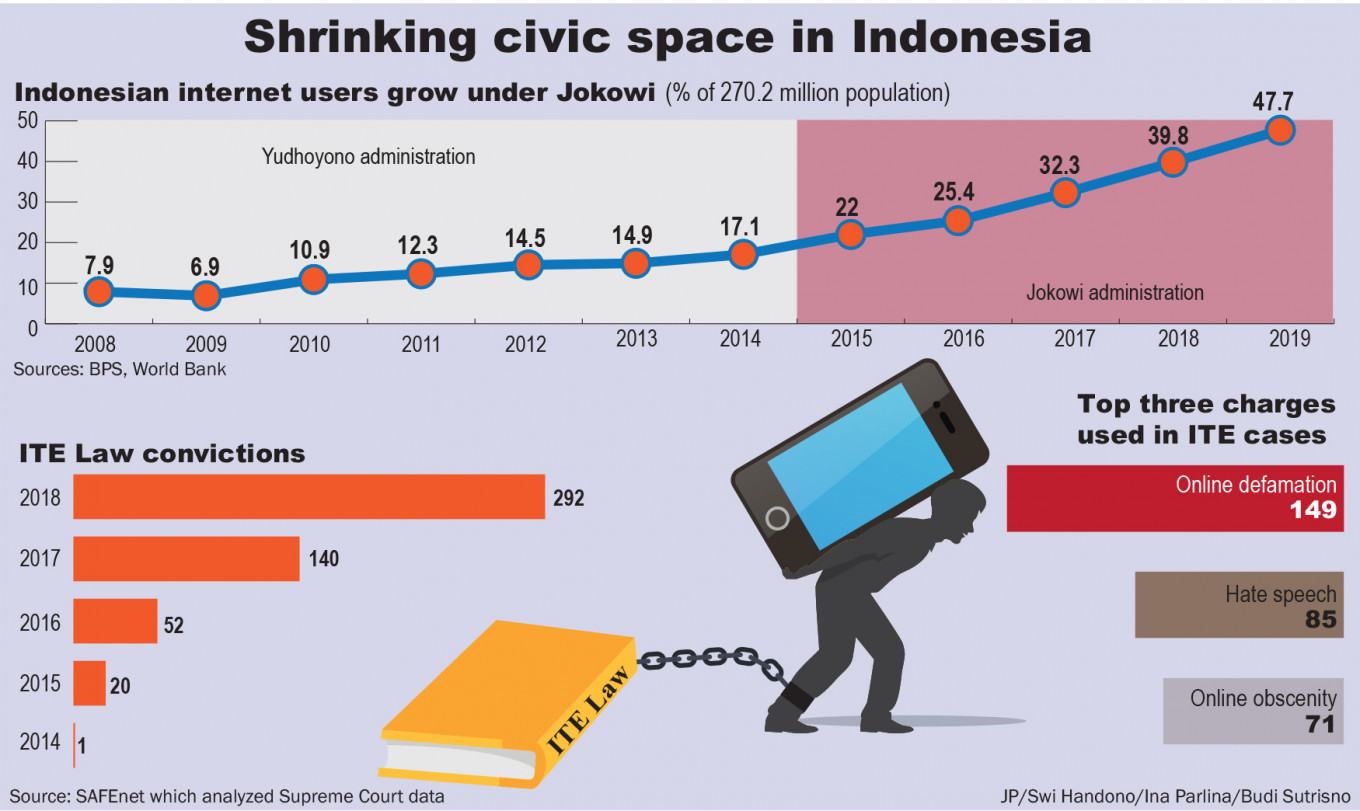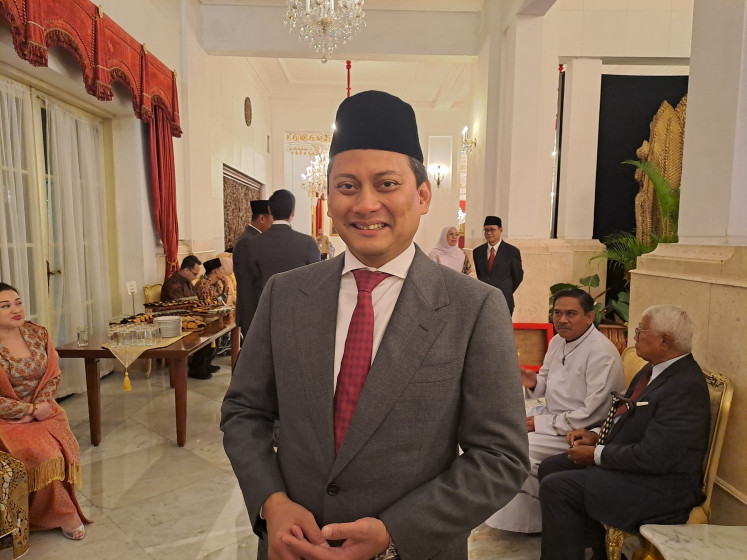Popular Reads
Top Results
Can't find what you're looking for?
View all search resultsPopular Reads
Top Results
Can't find what you're looking for?
View all search resultsAmending ITE Law: How should it look?
Revising the ITE Law is highly needed, especially to encourage members of society to express their opinions publicly without fear of criminalization.
Change text size
Gift Premium Articles
to Anyone
P
resident Joko Widodo’s recent statement on the freedom of speech has generated controversy. At an Indonesia Ombudsman event on Feb. 8 to launch its 2020 Annual Report, the President called on the public to be more vocally active in their criticisms and advice on maladministration to help improve public service.
His statement was met with skepticism, however, as criticizing the government under the Jokowi regime sounds very scary. A number of government critics have been arrested and imprisoned by the police in the last few years.
In March 2020, the police arrested Hisbun Bayu, a student at Muhammadiyah University-Surakarta, over his Instagram post that the police alleged had insulted the President. In the post, Hisbun called the President “a curse” for his investment policy that did not side with the people. In September 2019, the police detained Dandhy Laksono, a human rights activist and founder of the Watchdoc Documentary production house, after he tweeted his criticism of the government in its handling of the Papua riots, including imposing an internet blackout and arresting Papuan activists.
Law enforcers charged most government critics under Articles 27 and 28 of Law No. 11/2008 on Electronic Information and Transactions (ITE), specifically, paragraph (3) of the former and paragraph (2) of the latter. The ITE Law provisions neither offer a clear context nor sufficient elaboration on what constitutes information containing “elements of defamation” or information that could spark “hatred” or “conflicts in ethnicity, religion, race and inter-group relations [SARA]”.
The two articles can thus be conveniently used by the authorities to criminalize government critics, including those who offer their criticisms in good faith.
In fact, there is legal ground supporting the President’s call for greater criticism of government. Article 310, paragraph (3) of the Criminal Code elucidates an exception to defamation if it occurs in the service of public interests or in self-defense. In principle, Article 27, paragraph (3) of the ITE Law actually derives from Article 310 of the Criminal Code, but unfortunately this exception was not incorporated in the ITE Law.
The public controversy indicates that revising the ITE Law is highly needed, especially to encourage members of society to express their opinions publicly without fear of criminalization. It is hoped that the revised law will include several provisions and elucidations for legal clarity and certainty.
First, the revision must at least incorporate the exception stipulated in Article 310, paragraph (3) of the Criminal Code that protects individual who offer up their opinions in hopes of improving the bureaucracy.
Second, the revision must provide clarity on “defamation” to avoid the rampant reports submitted to the police by individuals who are, in fact, not victims of defamation. In most cases, it is not the alleged victims of defamation but their supporters who make a report to the police. Often, the targets of the criticism do not feel personally offended.
Third, the most important revision is to provide more detailed parameters to differentiate behavior that constitute defamation or public incitement of sociocultural conflicts and genuine criticisms expressed in good faith. These parameters serve to define the border between freedom of speech and acts of defamation.
For instance, a distinction should be made in reference to the factuality of the criticisms, the manner in which the opinion is delivered and the critic’s intention.
Using such parameters, law enforcement agents can easily distinguish which actions fall under freedom of speech and which are acts of defamation. For instance, when the substance of the criticism does not draw on facts or is exaggerated with the intent to cause social conflict, law enforcement can take the appropriate action. In these cases, the validity of the information is the grounds for law enforcement to determine if the behavior is an act of defamation or not.
In addition, law enforcement could examine whether the opinions are expressed in a violent manner that could stir up public controversies or in a rational way that offers a healthy room for discussion instead of one-sided indoctrination.
Law enforcement can also investigate a critic’s intentions. Intent is of crucial importance in criminal law, since there are several circumstances that justify protection for those without any malicious intent. These investigations could discover whether certain opinions are driven by certain political interests or a sincere purpose to reform the system.
All in all, acknowledging the necessity of revising the ITE Law may take a long time. In the short term, the President should instruct the law enforcement agencies under him, particularly the National Police, to refrain from taking arbitrary actions against criticisms on social media and/or detaining government critics before determining the criticisms’ factual bases and the manner in which they are made, as well as the critic’s intentions.
Issuing such an instruction could at least avoid multiple interpretations of the ITE Law to justify silencing critics. Guaranteeing and protecting freedom of expression will provide the government with the much-needed criticisms that will help it work better.
***
The authors are Jakarta-based lawyers practicing shipping, investment, corporate, energy and other fields in private and criminal law. The views expressed are personal.










